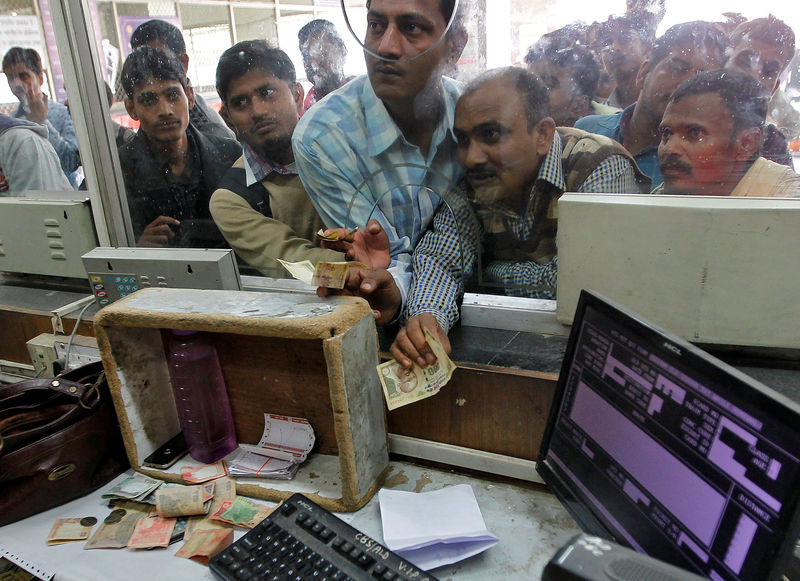By Sankalp Phartiyal and Neha Dasgupta
MUMBAI/NEW DELHI (Reuters) - Indians struggled to pay for basics goods like food and fuel on Wednesday and wondered how to get hold of their cash, after India suddenly withdrew 500 and 1,000 rupee notes from circulation in a bid to flush out money hidden from the tax man.
The shock measure also sent shudders through the investment community on a day when the markets were also reeling at the prospect of Republican candidate Donald Trump winning the U.S. election.
India's National Stock Exchange share index slumped as much as 6.3 percent in early trade before recovering some of the losses by around noon.
The currency move, announced late on Tuesday night by Prime Minister Narendra Modi, aims to bring billions of dollars worth of unaccounted wealth into the mainstream economy and curb corruption.
It was also designed to stop anti-India militants suspected of using fake 500 rupee notes to fund operations.
From midnight, the larger banknotes ceased to be legal tender for transactions other than exchanging them at banks for smaller notes.
Retailers refused to accept the bills, worth around $7.50 and $15 respectively, and people were unable to access ATMs after banks closed them down.
To be effective the move had to be unexpected, analysts said, but it was also fraught with problems for an economy largely fueled by cash, especially for India's poorest citizens, many of whom work in the large rural economy.
India's "black economy," a term widely used to describe transactions that take place outside formal channels, amounted to around 20 percent of gross domestic product, according to investment firm Ambit.
New bills, of 500 and 2,000 rupees, will be introduced from Nov. 10.
POLICE ON ALERT
Deepak Chhatoi, a salesman at a car varnishing store in Mumbai, said he had to turn away customers wanting to pay with larger bills, and could not buy the popular potato sandwich known as the vada pav.
"I couldn't even have breakfast this morning because there seems to be a shortage of change in the market," he said.
"The vada pav seller declined to sell to me because he did not have change."
The extent of the impact of the measures became evident as petrol stations and hospitals also refused to accept larger denomination banknotes, even though the government had given them a waiver to continue accepting them.
Meanwhile, bank ATMs were closed and banks prepared for the flood of people seeking to exchange larger banknotes for smaller ones.
Swapan Mandal, a laborer, wanted to withdraw 3,000 rupees from an ATM and send it to his family in Kolkata, in eastern India, but was unable to do so.
"I have only 500 rupees notes at home. I don't know if I will be able to send the money," he said.
A sub-inspector in New Delhi said the police commissioner had issued orders to watch for disturbances, especially at key retail outlets like petrol pumps.
"This is a sensitive time. We have to be alert," he said.
MARKETS REEL
Modi's move to go after hidden assets also threatens to derail politicians' election plans ahead of state polls including the key battleground of Uttar Pradesh early next year.
With no state financing, India's elections run on resources that candidates generate themselves, most of it in cash.
The main opposition Congress party said it supported moves to attack the black economy, but that withdrawing bigger denomination notes would hit the common man first.
"Ordinary Indians will suffer - families saving for weddings, the small traders and businessmen," said Randeep Singh Surjewala, the party spokesman.
In the stock market, real estate firms that depend on cash transactions were hit particularly hard, with DLF Ltd, India's biggest property developer, down more than 20 percent.
But analysts said the move would prove beneficial to India in the longer term, by ushering in transparency and bringing transactions into the formal economy, and providing additional revenue for a country that has long struggled to contain its fiscal deficits.
It could also lead to easing inflation, raising the prospect of additional rate cuts from the central bank, which lowered the key repo rate by 25 basis points last month.
"Despite (the) knee-jerk reaction in the markets and economy, we believe this step is very positive for government finances, the inflation/interest rate outlook, and long-term GDP growth," Macquarie said in a note.
